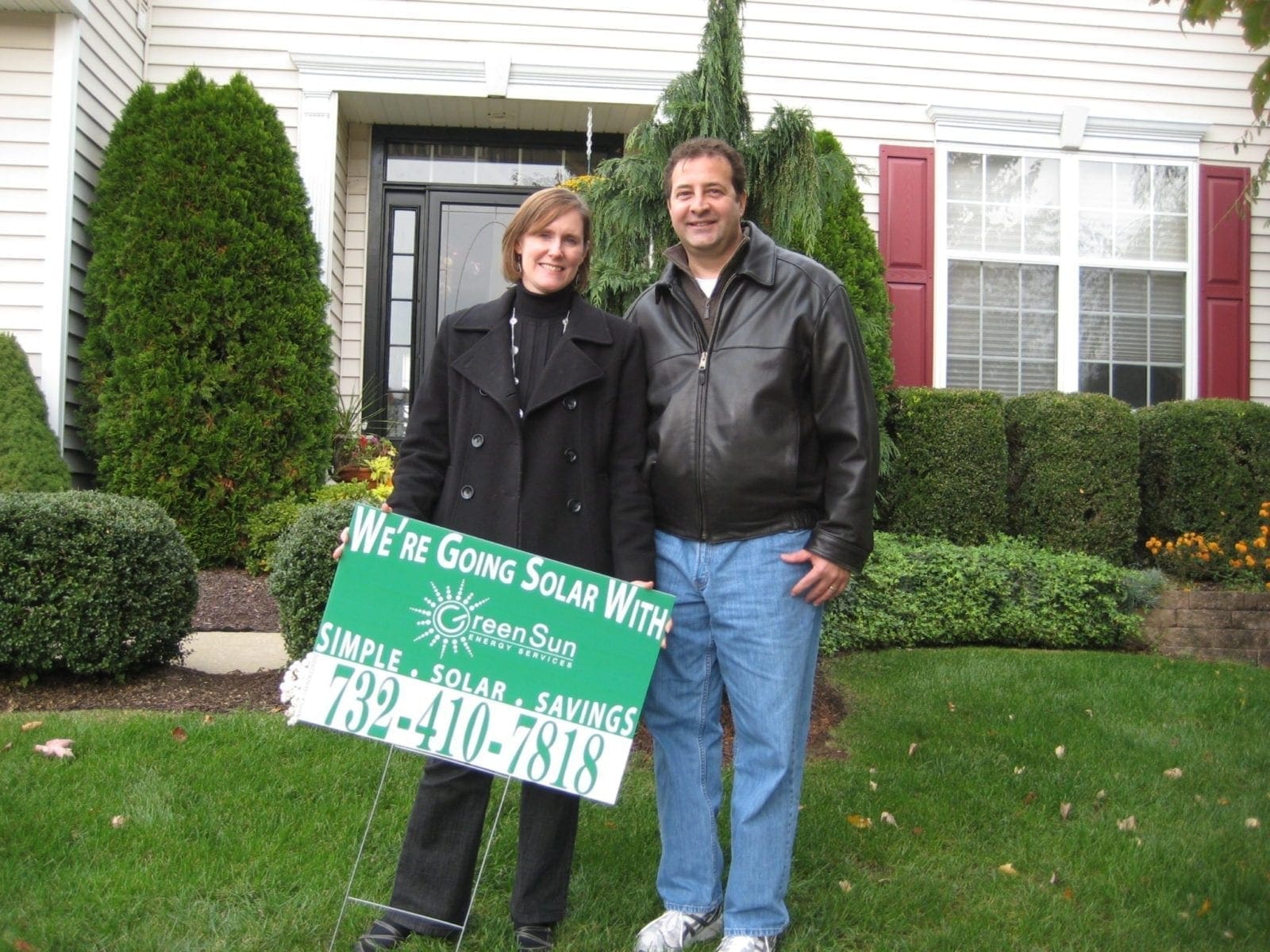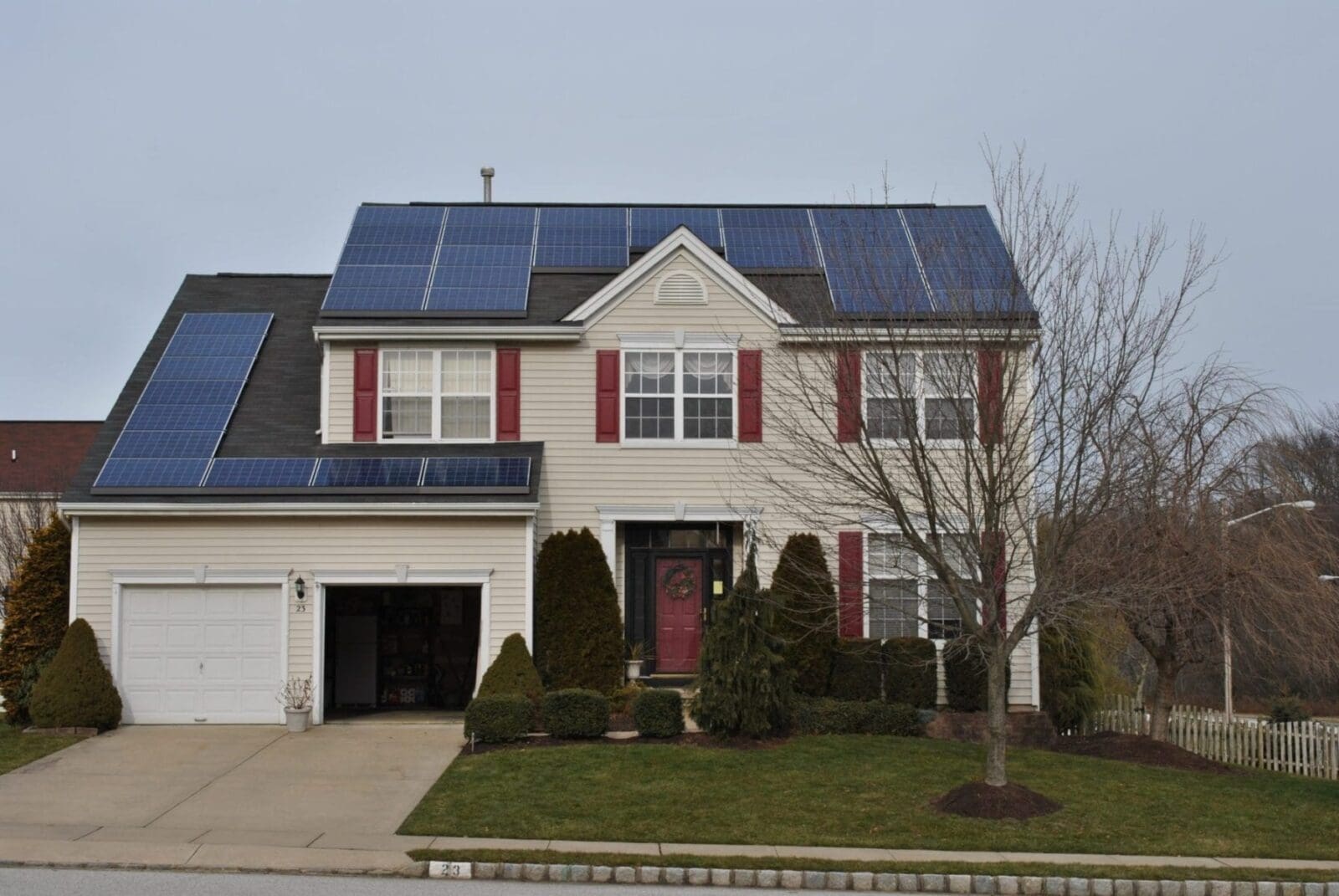Awesome service from start to finish. Ongoing management of our array is superior.
- Vincent S. in Burlington, NJ | Solar Review Source: Angie's List
8.82 KW DC Solar Panel System In Burlington, NJ
- Number of Canadian Solar NewEdge 235W 60 cell Poly-crystalline: 36
- Inverter Technology: EnPhase M215-60-2LL-S22/S23
- Annual Solar Energy Production: 10,461 kilowatt hours
- Annual Utility Offset: 62%
- Customer's Estimated Average Monthly Profit: $245+
- See live performance of this Burlington, NJ solar panel installation.
Searching For The Best Solar Company In Burlington, NJ?
Solar Panel FAQs For Burlington, NJ
Q: How Do I Go Solar In Burlington, New Jersey?
Going solar in NJ is a simple as 1-2-3.
- Solar Evaluation of your Home. Schedule your phone or in person appointment through our website. Our Solar Site Assessment specialists will ask you a few simple questions and survey your home (via satellite roof evaluation) – to evaluate your home’s solar potential. Based on your Solar Site Assessment and your financial goals our team will determine which solar financing options and esign make the most sense for you.
- Solar Design, Permitting and Installation. Once you feel comfortable with the solar program designed for you, we'll handle all of the permitting to install the solar panel system – typically installing your system in just one day!
- Utility Approval (PTO) and Activation. Once permission to operate is received from your utility provider, your solar energy system can be turned on to power your home – saving your family money while saving the environment.
Q: Can PV Solar Panels Increase the Value of my Home in Burlington, New Jersey?
Yes, according to a report produced by the National Renewable Energy Laboratory entitled "A New Market Paradigm for Zero-Energy Homes: December 2006 The Comparative San Diego Case Study"
"The greatest single gain in value was $446,410 for a home in the SheaHomes communities with a PV system owned for 26.9 months (a 79% increase in value). In comparison, the single largest gain for a home in the comparison community was $378,769 for a home owned for 40.2 months (a 61% increase)."
When you lease your system, things are going to be different. "FannieMae, B2-3-04: Special Property Eligibility Considerations (12/16/2014)", indicates that: If the solar panels are leased from or owned by a third party under a power purchase agreement or other similar arrangement, the following are some of the requirements that apply: The solar panels may not be included in the appraised value of the property. The lease payment must be included in the debt-to-income (DTI) ratio calculation. This requirement does not apply in the case of a power purchase agreement if the payment goes entirely to pay for the energy. Any portion of the payment that does not go toward the purchase of the energy must be included in the DTI ratio.
Q: Can I get credit for producing my own electricity in Burlington, New Jersey?
Yes. The energy that is produced by a solar panel system will first serve a home's electrical load. Then, if the solar panel system produces more electricity than the home needs at any given time, your utility credits the excess electricity at the same price you would pay for electricity from the utility - in effect turning the electrical meter backwards. This is called "Net Metering," and the credit will appear on the monthly utility bill. Should the home need more energy than the solar panel system is producing at any given time, the customer can be assured that the utility will provide the electricity that the home needs. Often, homeowners find that they receive credits during expensive peak daytime hours, and then use more utility power during less expensive evening hours.
Q: Will my Burlington property taxes go up if I install solar?
No, in October of 2008, New Jersey enacted legislation exempting renewable energy systems used to meet on-site electricity, heating, cooling, or general energy needs from local property taxes. Please see Property Tax Exemption for Renewable Energy Systems for more information.
Q: What is the lifespan of a solar panel system in Burlington?
Solar panel systems last a long time depending on the amount of active use, or the amount of sunshine converted into electricity by the solar panels. Most systems are only in use for 6 to 8 hours per day. Manufacturers will usually provide from 10 to 20 year warranties for the solar panels, and a 5- to 10-year warranty on the balance of system components. EnPhase provides a 15 year warranty on their micro-inverters. Solar panels have been reported to last 30 to 40 years.
Q: Can I install solar in a gated community or adult community in Burlington?
According to the ACT (C.45:22A-48.2) approved August 21, 2007, an association cannot restrict you from installing solar on your roof, so long as you own and are responsible for maintaining the roof. Please e-mail us at info@greensunnj.com to request a copy of this ACT.
Q: What is the environmental impact if I use solar power at my Burlington home?
As a general rule of thumb, studies indicate that the typical New Jersey home using solar power has an environmental impact of removing two cars from the road. Over 25 years, you will have avoided producing more than 500 tons of greenhouse gas emissions. Using solar electricity to power a million homes would reduce greenhouse gas emissions by 4.3 million tons per year, the equivalent of removing 850,000 cars from the road (Source: EPA).
Solar panels have received attention from researchers, businesses and homeowners because, unlike traditional power generation sources, these technologies produce electricity using a renewable source, the sun, without creating noise, emitting pollutants that cause climate change such as greenhouse gases, smog, acid rain, or water resource pollution. Even when the emissions related to solar cell manufacturing are counted, solar panels produce less than 15% of the carbon dioxide from a conventional coal-fired power plant.
Q: What are the benefits of having a solar panel system in Burlington, New Jersey?
- Reduce your utility bill - Solar panel systems can significantly reduce your utility bill. Any energy produced for free by the sun and your solar panel system is energy that you don't have to purchase from your utility. This translates into direct savings on your monthly utility bill. In addition to the direct savings, the solar panel arrays also act as a sunshade for your roof, reflecting heat from the sun that would otherwise be absorbed by your house. A shaded roof area can reduce the air temperature of your house, reducing the energy required by your air-conditioner to keep a comfortable temperature in your home.
- Increase the resale value of your home - Like any home improvement, a solar panel system should increase your home resale value by the amount of the installation. So even if you move from your present home, your solar panel system will have reduced your monthly utility bill and increased the value of your home if you do decide to sell.
- Healthy Environment - By using a renewable power source, you're helping reduce the impact of global warming and climate change. You will avoid producing hundreds of tons of greenhouse gases during the solar panel system lifetime.
- Energy Independence - Solar power can provide electricity in the event of a power outage or disaster. You will also decrease your use of foreign oil and minimize utility company price increases.
Q: Can solar replace an electric utility in Burlington, New Jersey?
Solar panel systems are typically used as either stand-alone systems or grid-connected systems. The role of solar panels in these two types of systems is very different, and the design decisions and performance requirements are very different as well. Stand-alone solar panel systems generate all of the on-site electricity needs of a home. Therefore, they are not connected to any electric utility. Stand-alone systems can provide AC or DC electricity, and typically include batteries to store electricity for use when the sun is not shining. Stand-alone systems are often cost-effective when installed in remote areas where access by electric utilities is difficult and expensive. Grid-connected solar panel systems are typically sized to meet at least 50% of a home's electrical load. These systems are not always sized to meet all of the electricity loads of a house because of the higher up-front costs associated with purchasing a larger system. Solar panel systems can be easily integrated with a utility's electrical grid to provide clean, renewable electricity for homeowners, while still ensuring continuous power supply from your regular utility.
Q: What is involved in maintaining and operating a solar panel system in Burlington?
Minimal maintenance is required of the homeowner. But don't worry, Green Sun Energy Services does all the work! We even clean the panels of any debris such as fallen leaves and pollen.
Q: How much does a solar panel system cost? What Rebates and Incentives are available in Burlington, New Jersey?
The actual cost of a solar panel system will depend on equipment options, installation costs, and the solar panel manufacturer. Please click on Get an Estimate for details on how much "going solar" can save you.
To see solar power state rebate information, please visit http://www.dsireusa.org/
Q: What happens to solar panels when it’s cloudy or raining in Burlington?
Photovoltaic panels can use direct or indirect sunlight to generate power, though they are most effective in direct sunlight. Solar panels will still work even when the light is reflected or partially blocked by clouds.
Q: What happens when I sell my house in Burlington, New Jersey?
When you purchase and own your system, your solar investment should increase the value of your house. The Appraisal Journal (October 1999), suggests that appraisers should increase the property value of a home with energy improvements by $20 for every $1 of annual energy savings.
When you sell your home, the Solar Installation is seen as a fixture on your house and is typically sold with the house. If you have an outstanding Home Equity Loan or Line of Credit, this will be closed out when you close on the sale of your home. SRECs if any are normally transferred to the new homeowner, but you can negotiate an assignment agreement with the buyer, whereby you retain ownership of the SRECs.






